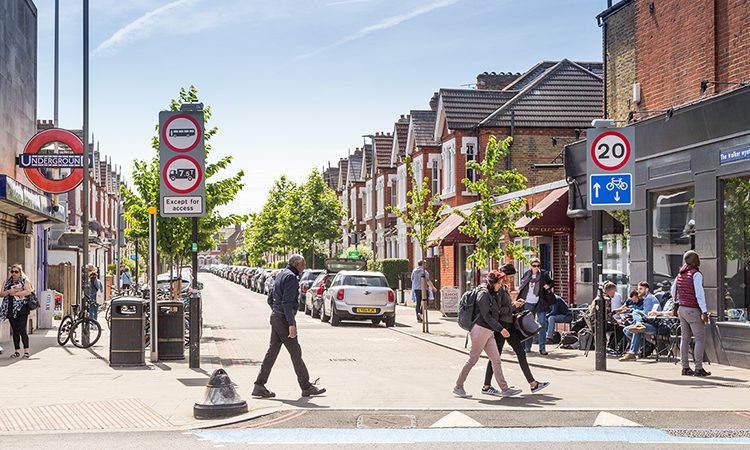TfL data shows 20mph speed limits improve road safety in London
- Like
- Digg
- Del
- Tumblr
- VKontakte
- Buffer
- Love This
- Odnoklassniki
- Meneame
- Blogger
- Amazon
- Yahoo Mail
- Gmail
- AOL
- Newsvine
- HackerNews
- Evernote
- MySpace
- Mail.ru
- Viadeo
- Line
- Comments
- Yummly
- SMS
- Viber
- Telegram
- Subscribe
- Skype
- Facebook Messenger
- Kakao
- LiveJournal
- Yammer
- Edgar
- Fintel
- Mix
- Instapaper
- Copy Link
Posted: 14 February 2023 | Intelligent Transport | No comments yet
According to the new data, TfL’s 20mph speed limit on key London roads has led to a 25% reduction in collisions and serious injuries, supporting its Vision Zero goal to eliminate death and serious injury on the city’s transport network.


Credit: Transport for London
Transport for London (TfL) has announced that it has released new data that shows a significant reduction in the number of collisions since the implementation of 20mph speed limits on key roads in London.
Monitoring of the 20mph schemes in London shows that since they were introduced, the number of collisions has reduced by 25% (from 406 to 304), and collisions resulting in death or serious injury have also reduced by 25% (from 94 to 71), demonstrating the huge impact of lowering speeds across London.
Furthermore, although vulnerable road users continue to be most at risk on London’s roads, since the 20mph speed limits have been introduced, collisions involving vulnerable road users have decreased by 36% (from 453 to 290), while collisions involving people walking have decreased by 63% (from 124 to 46).
In March 2020, TfL introduced a 20mph speed limit on all of its roads within the central London Congestion Charging zone, as part of its Vision Zero commitment to eliminate death and serious injury on the capital’s roads by 2041. Currently, over half of London’s roads have a 20mph speed limit, of which almost 110km is on TfL’s network.
TfL is now working to lower speeds on 220km of its roads by 2024, in inner and outer London, and plans to introduce a new 20mph speed limit on over 28km of roads in Camden, Islington, Hackney, Tower Hamlets and Haringey in March 2023.
New vision zero strategy to help eliminate fatalities on Leeds’ roads
In addition, collision data from around the world shows that the speed at which people are driving or riding is the single most important factor in whether a collision takes place and how severely people are injured. In 2020, speed was a contributing factor to 48% of fatal collisions.
Since the 20mph speed limits have been introduced across London, there have been reductions of 1.7-5mph across most sites surveyed. Analysis of journey times, traffic flows and speeds suggest that the 20mph speed limit has not increased congestion, and TfL will be undertaking further quantitative analysis to assess the impact on smoothing traffic flows.
TfL is also working with the Metropolitan Police to increase its capacity to take enforcement action against drivers and riders who speed. They are currently on target to be able to take action on a million speeding offences by 2024.
Will Norman, London’s Walking & Cycling Commissioner, said: “I’m delighted to see that the introduction of 20mph speed limits is having such a positive impact on the number of collisions on London’s roads… I look forward to the continued expansion of this programme on TfL roads and to working with colleagues in boroughs to make even more streets safer for Londoners.”
Penny Rees, TfL Head of Healthy Streets Investment, said: “It’s brilliant to see the huge impact the introduction of 20mph speed limits has had on road safety around London. We are determined to eliminate deaths and serious injuries from London’s roads in line with our Vision Zero goal, and this data proves that lowering speeds is crucial to achieving this goal. 20mph speed limits not only save lives, but also encourage Londoners to travel in more active and sustainable ways.”
If you liked this, you may also be interested in:
▶ TfL to move ahead with plans for new Nine Elms cycle route
▶ Active Travel England announces £200 million to improve walking and cycling routes
Related topics
Active travel, Passenger Experience, Traffic Management, Transport Governance & Policy, Vehicle & Passenger Safety
Related modes
Bikes & Scooters, Cars
Related cities
London
Related countries
United Kingdom
Related organisations
Metropolitan Police, Transport for London (TfL)
Related people
Penny Rees, Will Norman








